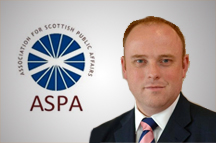"Who do you represent? Why do you want to speak to me? What do you expect me to do as a result?"
 These three questions should be the first things that come to a Parliamentarian or a Government official whenever they are approached by a lobbyist.
These three questions should be the first things that come to a Parliamentarian or a Government official whenever they are approached by a lobbyist.
If the answers they get are not sufficient to assure them this is a meeting or conversation worth having then they simply shouldn't go any further. Lobbying regulation really could be as simple and straightforward as that.
On Thursday MSPs will debate the Standards, Procedures and Public Appointments Committee's inquiry into lobbying which is expected to lead to a Scottish Government Bill on lobbying transparency.
The Committee heard calls for the creation of a register to identify anyone who may be lobbying members of the Scottish Parliament, the publication of how much organisations spend on lobbying, and details of the meetings they have with MSPs. This would affect campaigners and their groups from private businesses, trade bodies, charities and good causes, to trades unions and the churches.
We already have three pillars of regulation in the shape of codes of conduct for MSPs, Scottish Ministers, and the Civil Service, so it's worth asking whether these existing regulations could be amended rather than legislating for a fourth set of rules.
 For example, the MSP Code of Conduct could be revised to require MSPs to publish details of all meetings they have, to show the electorate and anyone else with an interest just who MSPs have been talking to and on what subjects. That should exclude individual constituents, but capture everyone else as it's essential to maintain a level playing field. Lobbyists should never have favoured access to MSPs but neither should they have secondary status.
For example, the MSP Code of Conduct could be revised to require MSPs to publish details of all meetings they have, to show the electorate and anyone else with an interest just who MSPs have been talking to and on what subjects. That should exclude individual constituents, but capture everyone else as it's essential to maintain a level playing field. Lobbyists should never have favoured access to MSPs but neither should they have secondary status.
Creating a lobbying register to disclose a huge level of information may not actually improve the public's understanding or confidence in the political process, especially if much of that lobbying activity doesn't actually come close to reaching MSPs or influencing their decisions.
It may be more useful to focus on those being lobbied as it's their decisions on how they vote or what they support which matters. There's a responsibility on lobbyists to behave ethically, but also on the MSPs they lobby to record and publicly declare who and what they listen to when they come to make decisions or vote.
The Commissioner on Ethical Standards in Public Life in Scotland Stuart Allan told Holyrood's Standards Committee "lobbying is a legitimate and recognised part of the democratic process". In the past six years Mr Allan's considered two lobbying complaints lodged with him under the MSP Code of Conduct and has not found a single breach of regulations on lobbying. That doesn't mean there are no problems, but it does give Thursday's debate an important sense of proportion.
We cannot and should not expect MSPs to be experts in every field on which they legislate, but we should absolutely expect them to be as well-informed as possible before they take decisions on laws and regulations. This means meeting with all sides on a particular issue, listening to what they have to say, and considering that information when MSPs develop party policies or decide how to vote in Parliament. That's part of what being an MSP's about - taking the responsibility to listen to all sides and then making your own mind up.
MSPs are many things to many people, but no one should see them as delicate flowers in need of protection by regulation inside the Holyrood hothouse. It's essential MSPs have as much exposure as possible to the world beyond the political bubble and lobbying is an important aspect of that world.












